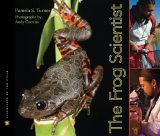 The Mighty Mars Rovers: The Incredible Adventures of Spirit and Opportunity Elizabeth Rusch
The Mighty Mars Rovers: The Incredible Adventures of Spirit and Opportunity Elizabeth RuschI'm back looking at more the books on YALSA's Excellence in Nonfiction for Young Adults long-list.
This is another great addition to the always excellent Scientists in the Field series. Steven Squyres is a geologist who wanted to study the rocks on Mars. He came up with the idea to send a robotic geologist in his place. The Mars Rovers went up in 2003. Spirit and Opportunity were supposed to last about 3 months. They lasted for years. Opportunity is *still* going and doing science.
I really enjoyed the way the book follows the Rovers and the team on Earth. It does a great job of showing how the scientists on the ground had to often quickly build a "fake Mars" to figure out if there was a way they could get a rover out a jam-- up a hill, or out of a sand dune. It's also so well that I almost cried when Spirit went quiet. No little robot who's lasted years longer than you should, don't die!
It also does a great job of explaining why this type of exploration is important and why we're so obsessed with studying Mars.
You can follow the Mars Rovers on NASA's website.
Update: I forgot to link to today's Nonfiction Monday roundup! It's at Perogie's and Gyoza.
Book Provided by... the publisher, for award consideration.
Links to Amazon are an affiliate link. You can help support Biblio File by purchasing any item (not just the one linked to!) through these links. Read my full disclosure statement.






